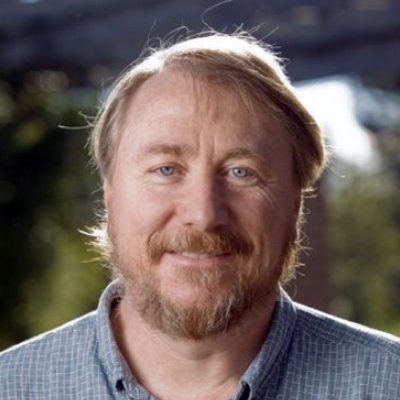Performing experiments to see, quantify, and understand the evolutionary process
Evolution is usually thought of as a slow process—one that cannot be directly observed but instead can only be studied by looking back in time using fossils or the comparative method to see the past history of life. However, Dr. Lenski’s approach is to watch evolution while it happens in experiments under controlled conditions. To study evolution in action requires organisms that replicate and evolve quickly, so that one can see and measure the resulting changes on a reasonable time scale. Dr. Lenski is advancing the study of evolution in action on several fronts including a unique multi-decade experiment with bacteria, research on viruses that can infect and coevolve with bacteria, and a multidisciplinary collaboration on artificial life in the form of computer programs that can evolve the ability to solve complex problems.
Dr. Lenski describes his research as “curiosity driven” but it also has important practical implications and applications. His expertise on the mechanisms and dynamics of evolution have led him to serve on panels that examined the scientific approaches used to investigate the 2001 anthrax letter attacks and that proposed frameworks for evaluating the benefits and potential risks of genetically engineered organisms. The analyses and findings from his experiments on evolving microbes are widely cited and emulated by researchers studying infectious diseases and even cancers. And his work on evolving computer programs has been highly influential for researchers who want to apply the power of biological evolution to solve problems in computational and engineering domains.
Dr. Lenski’s on-going research projects include:
-
Long-Term Evolution Experiment: In 1988, Dr. Lenski began what has become a famous study of evolution in action. In this experiment, 12 populations were started from the same strain of E. coli bacteria and placed in identical environments. Every day, a portion of each population is transferred to a fresh environment, and this process has continued for 27 years and more than 60,000 bacterial generations. To date, this experiment has provided new insights into the process of adaptation by natural selection, the dynamics of genome evolution, the repeatability of evolution, and more. Looking ahead, an important opportunity will be to integrate new “omics” technologies—genomics, transcriptomics, proteomics, and metabolomics—to understand how the various mutations that have arisen improve the bacteria’s competitiveness.
-
Coevolving Bacteria and Viruses: Bacteria are important not only in human health and disease, but also because they perform essential functions in the environment. While people usually think of bacteria as infectious agents (as some are), bacteria are themselves often infected by viruses called phages. Dr. Lenski and his team use bacteria and phages as experimental systems to study the ecological and evolutionary dynamics of host-pathogen interactions. Questions of pressing interest include how viruses mutate and evolve to overcome host resistance, and how evolution shapes whether viruses will replicate quietly along with the host genome or instead convert the host cell to a virus “factory” leading to its death.
-
Bacterial Evolution and Disease: Dr. Lenski seeks to start two new projects that will shed light on bacterial evolution in the context of human diseases. Working with a colleague with expertise in bacterial pathogenesis, they hope to sequence bacteria isolated from chronic, life-threatening infections of the lung that can persist for decades in patients with cystic fibrosis. By understanding how bacteria adapt to their hosts, one can learn what aspects of the host environment matter to the bacteria and, by so doing, perhaps identify strategies to control these infections. Working with the samples from his long-term experiment, Dr. Lenski hopes to gain new insights into the origins and management of antibiotic resistance, which has become a global health concern. While the overuse of antibiotics certainly plays an important role in this problem, it is not well understood how resistance persists in the absence of antibiotic use. Dr. Lenski proposes to survey the effects of antibiotic-resistance genes on the resistance levels and competitiveness of the non-pathogenic E. coli bacteria from his long-term experiment, to determine whether these effects are constant over time or, alternatively, depend strongly on the specific genetic context in which resistance arises.
-
Evolving Digital Organisms: Evolution experiments require organisms that replicate, mutate, and evolve quickly, so that one can observe changes on a reasonable time scale. In addition to his research on bacteria and viruses, Dr. Lenski works with computer scientists and others to study the dynamics of evolution in artificial worlds where “digital organisms” replicate by copying their genomic instructions, mutate when those instructions are miscopied, compete for the resources they need to survive and reproduce, and thus evolve in much the same way that biological organisms evolve. And because digital organisms evolve inside a computer, one can trace each and every step along the way to develop a deeper understanding of the subtleties of evolutionary dynamics. One can also use evolving computer programs to tackle real-world problems. Based on his research with bacteria and viruses, as well as his interactions with engineers and computer scientists, Dr. Lenski and his team are constantly generating new ideas and hypotheses that can be developed and tested by performing evolution experiments with digital organisms.
Bio
Dr. Lenski grew up playing sports and games, intrigued by the tension between luck and skill and how their interplay affects the outcome. As it turns out, the interplay between chance and necessity—between the production of genetic variation by random mutation and systematic differences in fitness that reflect natural selection—also lies at the heart of the evolutionary process and Dr. Lenski’s research program.
Dr. Lenski did his undergraduate research at Oberlin College, where he majored in biology. He had not planned on becoming a scientist, but as a freshman he took a non-majors course in biology that fascinated him. He was especially interested in ecology and evolution, because there were so many wide-ranging and unanswered questions. Thinking that evolution was only about the past, and ecology about the future, Dr. Lenski did his Ph.D. in ecology at the University of North Carolina, Chapel Hill, where he studied competition between insect species in the southern Appalachians.
Through the influence of his graduate teachers, Dr. Lenski came to realize that evolution was an ongoing process—one that was usually too slow to observe but that nonetheless shapes the future as well as the past. He realized, though, that to see evolution in action would require new skills and new study systems, so for his postdoctoral research he learned to work with bacteria and viruses that infect them. Given their rapid growth and large population sizes, it would be possible to observe and study their evolution in real time.
As they say, the rest is history. Dr. Lenski has been a world leader in showing the power of experimental evolution—publishing over 200 papers including many in Science and Nature; mentoring dozens of students and postdocs who have become scientific leaders; leading a long-term experiment with E. coli that has yielded countless insights over 25 years and 60,000 bacterial generations; collaborating with researchers from other disciplines to study artificially evolving systems; and receiving many honors including a “Genius” award from the MacArthur Foundation and election to the National Academy of Sciences.
Dr. Lenski still enjoys playing games, whether it’s one-on-one basketball with his son-in-law or board games with friends and family. And he enjoys seeing evolution in action in our own species as his grandchildren appear on the scene, reminding him that we are all part of the great tree of life.
Lab website: http://lenski.mmg.msu.edu and personal blog: http://telliamedrevisited.wordpress.com
In the News
"Science"
New York Times
Publications
Videos
Awards
Honorary Doctorate
2013, Wageningen University
National Academy of Sciences, USA
2006, Elected Member
American Academy of Arts and Sciences
1998, Elected Fellow
“Genius” Award
1996, MacArthur Foundation
Presidential Young Investigator Award
1988, National Science Foundation


